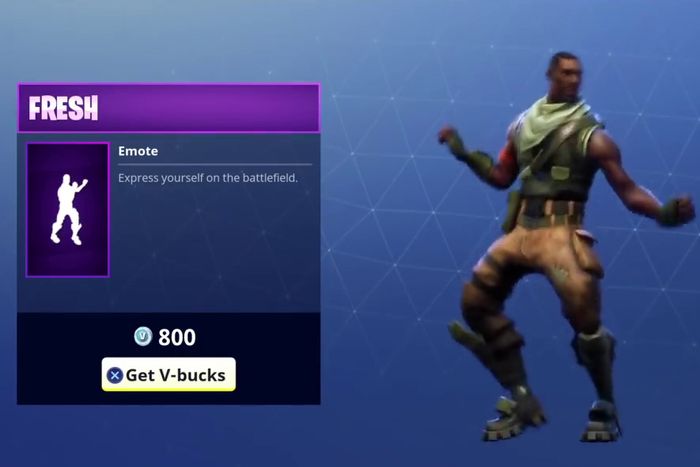
The legal battle over Fortnite’s popular emotes continues. In a court filing last Friday, attorneys for Epic Games argued that lawsuits claiming the studio had infringed upon intellectual property by cloning dance moves were meritless. Emotes, if you recall, are movements that players can make their in-game avatars perform at will. Responding to a suit from rapper 2 Milly, whose “Milly Rock” move was cloned into Fortnite as an emote called “Swipe It,” lawyers wrote, “No one can own a dance step. Copyright law is clear that individual dance steps and simple dance routines are not protected by copyright, but rather are building blocks of free expression, which are in the public domain for choreographers, dancers, and the general public to use, perform, and enjoy.”
The filing continues on to describe, in painstaking detail, the ways that the Milly Rock and Swipe It are different.
The Dance Step [Milly Rock] consists of a side step to the right while swinging the left arm horizontally across the chest to the right, and then reversing the same movement on the other side—namely, a side step to the left while swinging the right arm horizontally across the chest to the left. … By contrast, Swipe It consists of (1) varying arm movements, sometimes using a straight, horizontal arc across the chest, and other times starting below the hips and then traveling in a diagonal arc across the body, up to the shoulder, while pivoting on the balls and heels of the feet, (2) a wind up of the right arm before swiping, and (3) a rolling motion of the hands and forearms between swipes.”
Epic’s legal team also argues that Swipe It is not merely a dance move; it “allows players to express themselves on the battlefield and ‘to personalize their Fortnite experience.’”
The hearing date for 2 Milly’s lawsuit is set for March 11, though it is only one of a handful of similar lawsuits alleging Epic infringed upon dancer’s copyrights. The obvious inspirations for emotes such as “Floss,” “Orange Justice,” and “Fresh” have also made claims against the game studio. “Fresh” is better known as the Carlton dance, and Alfonso Ribeiro, who popularized it, has filed suits against Epic and another video game publisher, Take Two, whose title includes the move.
This week, Ribeiro suffered a setback when the U.S. Copyright Office denied his attempt to register the Carlton dance. Responding to Ribeiro’s application, the office pointed out that only NBC holds the copyright to the Fresh Prince of Bel-Air episode in which Ribeiro performed the move. Additionally, he performed the move on Dancing With the Stars in a routine likely choreographed not by himself, but by his professional dance partner.
The legal question over whether someone can own a dance move is largely settled. Individual moves can’t be copyrighted, but a full choreographed routine can be (like how a word can’t be copyrighted but a song can be). Epic has a lot of precedent on its side in this matter. But the fact that Epic’s conduct is legally sound is separate from whether it is ethically sound. Settled legal matters can be unsettled, and in this case, the legal system should revisit how it views choreography, in light of technological innovations.
The ability to perfectly re-create a series of movements is, in the grand scheme of things, very new. If Person A creates a dance move and Person B performs it, that does not seem ethically dubious. By virtue of being different people with different bodies and cadences of movement, that seems to me like fair use.
However: If Person B were to transplant Person A’s dance move into a digital file, so that A’s movements are infinitely, identically reproducible — and then, B were to sell that file to millions of Person Cs without Person A’s authorization, that seems kind of messed up! It seems shady for Epic to clone movements, give them winking names that all but outright say who the inspiration for said moves are, and then claim they don’t owe their inspiration anything in return. These concerns are not limited to only Fortnite, or only video games that include emotes. Last year, Jet Li revealed that he turned down working on The Matrix because they wanted to motion-capture his moves and retain ownership of them. “I was thinking: I’ve been training my entire life. And we martial artists could only grow older. Yet they could own [my moves] as an intellectual property forever,” he said.
And then there’s the question of who, exactly is using the move. Is the player controlling a Fortnite avatar and hitting a button performing the move? Is Epic by virtue of owning the Fortnite platform, engaging in public exhibition? If dance moves are, as Epic asserts, not complete works but are instead “building blocks” of free expression, Fortnite provides players a very limited set of blocks. American intellectual property law, as far as I can tell, has no method of addressing these questions.
Consider, for comparison’s sake, that there are plenty of laws surrounding the use of likenesses. Companies usually can’t use a picture of a celebrity for advertising purposes without that celeb’s consent. We are now at a stage, technologically, where reproducing motion patterns at scale is roughly as easy as reproducing someone’s photo. That’s a new technology-driven conundrum that, as emotes grow in popularity and profitability, we — the entertainment industry, the legal system, society — should address.





























